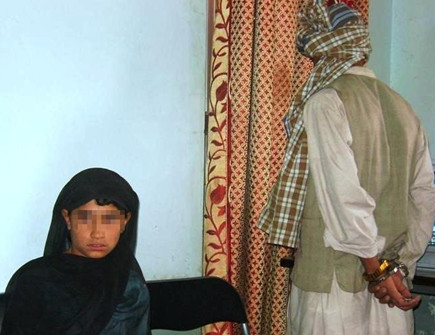Human rights groups are calling on the Afghan government to adopt a new law which would more clearly differentiate rape, a criminal offence, from consensual adultery, considered a serious crime in the country.

The victim (left) and the rapist handcuffed (right). (Photo: IRIN)
"Rape and adultery are two different issues and should be separate in law. Rape is an act of violence and coercion and the inflicting of suffering on a victim, and is not consensual, whereas adultery is consensual, freely chosen," Sonya Merkova, a researcher at London-based Amnesty International, told IRIN.
Parwin Rahimi, an official of the Afghanistan Independent Human Rights Commission (AIHRC), and Ajmal Samadi from the Afghanistan Rights Monitor (ARM) echoed this standpoint.
"Rape needs to be legally recognized as a heinous crime and must be dealt with separately from Islamic adultery penal codes," Samadi told IRIN.
Many Afghan judges confuse rape with adultery which, rights activists say, adds insult to injury for the victims.
Mawlawi Mohammad Qasim, a member of the Penal Bureau in the Supreme Court, for instance, describes rape as "an illicit sexual relationship between a man and a woman who are not married to each other".
Judicial officials and the police are unaware - or not convinced - that rape is a serious crime, according to a report by the UN Assistance Mission in Afghanistan (UNAMA).
"The reality for most female victims is that state institutions fail them," says the report entitled Silence is Violence.
Legal ambiguity
Courts prosecute cases of adultery and rape according to Articles 422-433 of the 1976 Penal Code which, according to rights groups, do not explicitly criminalize rape.
The Code prescribes 7-15 years jail for adulterers and rapists depending on their marital status, age and other circumstances.
"Women in Afghanistan, victims of rape, are often at risk of being convicted of `zina' [fornication outside marriage] under Article 427 of the Afghan Penal Code, and are denied justice. Indeed, the crime of rape committed against them, through no fault of their own, is compounded by further victimization in being prosecuted by the state for `zina'," said Amnesty's Merkova.
"In instances of forced sexual intercourse, law enforcement and judicial authorities overwhelmingly resort to the concept of `zina', which does not adequately address the issue of consent, one of the core elements of the crime of rape," UNAMA said in its report.
The issue of the criminalization of rape is further complicated by the fact that judges rely extensively on their own interpretation of Islamic law and its jurisprudence when adjudicating `zina' cases, according to UNAMA.
Another problem with the existing Penal Code is its lack of support for the victims of rape. "There should be legal and psychological support as well as protection services for the victims of rape," Fawzia Amini, a top official in the Ministry of Women's Affairs, told IRIN.
Marital rape
Supreme Court judges Bahauddin Baha and Mohammad Qasim affirmed the husband's prerogative in sexual affairs with his wife/wives. An Afghan man is allowed to have up to four wives at a time but an Afghan woman cannot have more than one husband, according to the country's Islamic laws and strong patriarchal traditions.
Even if a husband forces his wife to have sex with him, this is not considered rape, according to many judges.
"The issue of marital rape is never considered or reported, since women have no choice in terms of consenting to sexual intercourse with their spouse," says UNAMA's report.
However, women's rights activists say marital rape is a reality and should be dealt with through appropriate legal mechanisms. "It is nothing but rape when a husband forcefully copulates with his wife despite her objections," Rahimi of AIHRC said.
"Amnesty International considers acts of marital rape violence against women and a criminal offence," said Merkova.
The issue of marital rape is relevant as both child and forced marriages are prevalent in Afghanistan, particularly in rural areas, say analysts. "A forced marriage is in fact a kind of rape, and so is child marriage," said Rahimi.
New law for Shias
On 27 July the government published in the Official Gazette a controversial law for the country's Shia minority which, according to Human Rights Watch (HRW), deprives women of many basic rights.
"It also effectively allows a rapist to avoid prosecution by paying 'blood money' to a girl who is injured when raped," said the US-based HRW in a statement on 13 August.
The government has repudiated such criticism, saying the Shia Personal Affairs Law was promulgated in accordance with Shia religious jurisprudence and is strongly supported by most Shia people.



